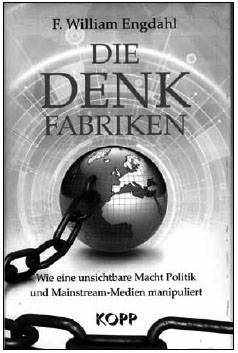Think tanks – the invisible power
Think tanks – the invisible power
William F. Engdahl – Autocratic structures threatening democracies
rt. A compact summary of international networks and their “think tanks”, intervening in politics, is provided by William F. Engdahl’s depiction “Die Denkfabriken. Wie eine unsichtbare Macht Politik und Mainstream-Medien manipuliert” (The Think Tanks. How Invisible Power Manipulates Politics and the Mainstream Media). Engdahl is a renowned expert in the field of geopolitical analysis. He analyses independently of the mainstream and has repeatedly picked up controversial issues such as genetic engineering or currency policy.
In a historical-systematic manner, Engdahl analyses various think tanks and the players behind them, who have decisively influenced decisions on war and peace for decades. Due to the number and persuasiveness of publications and documents in the past 20 years concerning the mechanisms and associations, through which major policy decisions are globally made by small elites outside of any democratic legitimacy, a public debate is currently under way. Meetings of the “Bilderbergers”, the “Trilateral Commission” and also of the “Atlantic Bridge” have both been continuously documented and critically evaluated in their effects, so that an objective representation has been made possible. Meanwhile, the historical development of these institutions has also been reappraised.

It is William Engdahl’s achievement to have depicted the current associations and foundations and their history. Networks, based on Anglo-American power elites, have retained their influence on current policy-making down to the present day. Foundations, which are used to intervene directly in politics, are also extensively described. Here, he also analyses foundations ostensibly committed to protecting the environment, in reality, however, pursuing power political goals (Aspen Institute). Engdahl describes in detail various institutions and their donors, such as the European Council on Foreign Relations, Chatham House, Center for a New American Security, the German Marshall Fund, Atlantic Council, PNAC, RAND-Cooperation. He also depicts individuals and their interconnections, such as George Soros, David Rockefeller, Zbigniew Brzezinski, as well as current politicians, including European ones. Engdahl‘s publication implies the call for transparency and for democratisation of these institutions. Especially in times of a possible atomic overkill, decisions made by small secret circles having a global impact, are no longer to be tolerated. •
Engdahl, William. Die Denkfabriken. Wie eine unsichtbare Macht Politik und Mainstream-Medien manipuliert. Kopp-Verlag. Rottenburg 2015. ISBN 978 3 86445 216 1